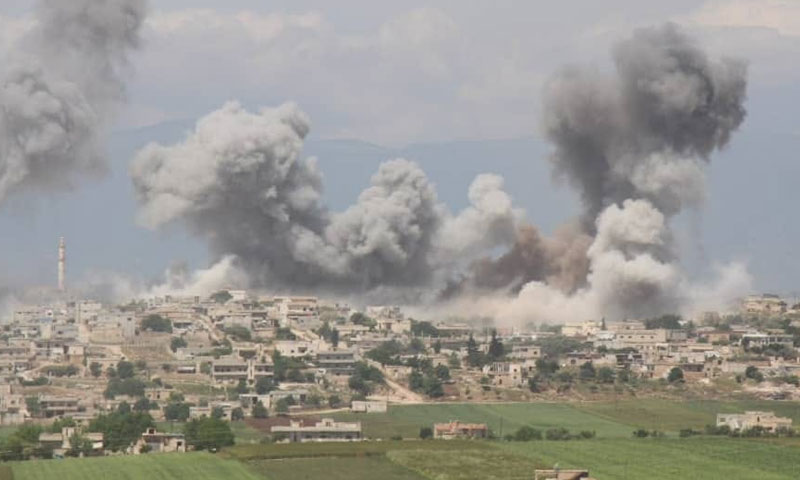



The local councils of the southern countryside of Idlib continue to operate in displacement areas in northern Syria, weeks after the Syrian regime took control of large parts of the southern countryside of Idlib.
In late August, Syrian regime forces took over Khan Shaykhun, al-Tamanah and al-Hubit in the southern countryside of Idlib, in addition to towns in northern Hama countryside connected to the area.
The regime managed to take control over these areas thanks to the military campaign, considered as the largest in the region. This has pushed many inhabitants to move deep inside Idlib governorate, escaping the weapons of the regime and Russia, which have previously targeted markets, residential neighborhoods and vital facilities during the battle of control.
The Head of the Local Council of Khan Shaykhun, Abdul Majid Sarmani, said the council is still operating in displacement areas without having any specific headquarters, away from the city, which has remained under the control of the regime.
“The Council is currently addressing the cards and seals of the displaced, and working to provide relief aid in displacement areas,” clarified Sarmani during an interview with Enab Baladi.
The population of the city of Khan Shaykhun is estimated at between 65,000 and 70,000 people before the military campaign, according to Sarmani.
Abdul-Karim Zarzour, the Head of al-Hubit Town Council, asserted that while moving, the Council continues providing the necessary and possible services for the displaced people wherever they are in the northern areas of Idlib.
“As a Local Council, we are sparing no effort to secure anything we can offer to the displaced people, despite the difficulties we face,” Zarzour added during an interview with Enab Baladi.
The difficulties Zarzour is referring to mainly revolve around the dispersed members of the Council due to displacement, the lack of a workplace and the Council’s scarce resources. Thus, the needs of the displaced people could not be met amid the difficult circumstances the region is going through.
Local councils that moved from southern Idlib to places of displacement also complain about the lack of support and the relevant organizations’ reluctance to help them. As a result, the councils are helpless and unable to provide the displaced in those areas with the help they need, insisted Basel al-Bakri, the Head of al-Tamanah Local Council.
“People have lost faith in the local councils as a result of the organizations’ cutting of all kinds of support, including relief, healthcare, housing and other services,” asserted al-Bakri during an interview with Enab Baladi.
Mohammed Abu Yahya, the Director of the Hama Branch at the Ministry of Local Administration and Services, affiliated with the Salvation Government, said that local councils in areas recently lost by the opposition are mainly located in regions that include a high number of displaced people.
The Council of Qalaat al-Madiq is located in Kafr Lusein, because there is a large number of townsmen, and this applies to the rest of the councils, according to Abu Yahya.
He told Enab Baladi that these councils are working only with the sources and staff they have in the areas of displacement. “There are local councils having mechanisms and carrying out several activities, including the preparation of land on which camps and apartments will be built,” added Abu Yahya.
He pointed out that most of these councils’ works are done in coordination with the Ministry of Development and Humanitarian Affairs, affiliated with the Salvation Government, especially with the Department of Displaced Persons and Camps Affairs. They are working to provide shelters or camps and assistance to newly displaced families.
Nonetheless, these councils’ efforts to assist IDPs in southern Idlib countryside have almost stopped, because international and organizational support for them has been cut. Additionally, both IDPs and Council members are being displaced.
if you think the article contain wrong information or you have additional details Send Correction